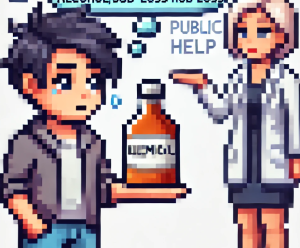
The Treatment Cost$ of Depression
It’s easy to overlook the silent struggles of mental health. One such struggle is depression, a condition that has grown increasingly prevalent across all socioeconomic groups and geographic regions. The economic and social impact of depression is profound, touching every aspect of life, from personal health to productivity at work.
A recent review, The Economics of Treatment for Depression, by Chad Stecher, Sara Cloonan, and Marisa Elena Domino, illuminates the financial burdens and effectiveness of various treatments. Let’s examine the key points and understand why this research is crucial for public health practitioners and the general public.
Depression: A Global Epidemic
Depression is one of the leading causes of disability worldwide. It affects people from all walks of life, yet its impact is often misunderstood or underestimated. The authors highlight that depression doesn’t just affect the individual; it has ripple effects on families, workplaces, and societies. The economic burden is staggering, with the cost of depression in the United States alone estimated at $326 billion in 2020. This figure encompasses direct medical costs, workplace productivity losses, and societal costs due to suicide.

Barriers to Effective Treatment
Despite the availability of numerous treatment options, many barriers prevent effective care for those suffering from depression. Cost is a significant barrier, particularly for those in lower socioeconomic groups. The lack of culturally tailored treatment options and the stigma surrounding mental health also play a role. Provider shortages further exacerbate the issue, leaving many without the necessary support.
The Evolution of Depression Treatments
Historically, treatments for depression have evolved significantly. From ancient herbal remedies to modern pharmaceuticals, the approach to treating depression reflects our growing understanding of mental health. The mid-20th century brought about a revolution with the discovery of antidepressant medications, transforming the treatment landscape. Today, treatments range from psychotherapy and pharmacotherapy to newer modalities like ketamine infusion therapy and digital interventions.
Comparing Treatment Modalities
The review emphasizes the need for comparative research to better understand the efficacy and cost-effectiveness of different treatments. Traditional treatments like psychotherapy and pharmacotherapy have a substantial body of research supporting their benefits. However, newer treatments, such as mobile health interventions and psychedelic-assisted therapies, show promise but require further investigation.
Digital Interventions: A Promising Solution
One of the most exciting developments in depression treatment is the rise of digital interventions. These treatments, delivered through smartphones and other digital platforms, offer scalability and accessibility that traditional face-to-face therapies cannot. Especially in light of the COVID-19 pandemic, telehealth services have become a vital tool in mental health care, providing a lifeline to those who might otherwise go untreated.
Policy Implications and Future Directions
The authors suggest several policy solutions to address the growing burden of depression. These include reducing restrictions on the supply of mental health providers, implementing digital interventions, and promoting healthy lifestyles. By making these changes, we can improve access to treatment and reduce disparities in care.
Why This Matters
Understanding the economics of depression treatment is crucial for public health practitioners and policymakers. The costs associated with untreated depression are not just financial—they affect educational attainment, workplace productivity, and overall quality of life. By investing in effective and scalable treatments, we can mitigate these costs and improve outcomes for individuals and communities.
Engaging with the Research
Now that you’ve gained some insights into the economics of treating depression, we’d love to hear your thoughts. Here are a couple of questions to get the conversation started:
- Have you or someone you know experienced barriers to accessing mental health care? What were they, and how did you overcome them?
- What are your thoughts on digital interventions for depression treatment? Have you tried any, and if so, what was your experience like?
Feel free to share your experiences and thoughts in the comments below or on social media using the hashtag #DepressionEconomics.
Empower Your Network – Subscribe and Share!
Unlock key insights with ‘This Week in Public Health.’ Subscribe for free and share to drive change as part of a dedicated community.



